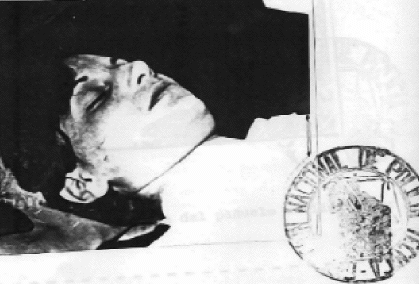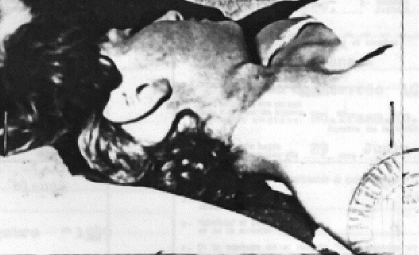
Nibia in 1974 was studying in Montevideo to be a literature professor. She was born in the small town of Nueva Helvecia (New Switzerland) in southwest Uruguay on 10 Sept. 1949. She was described as a brillant student and she was an activist in the PCU -- the Communist Party of Uruguay. She was 24 years old.

On 29 June 1974, at 2 a.m., three men in uniform and two civilians broke down the door of her apartment and took her prisoner. At noon the same day, less than 12 hours after she was taken, the military informed her family that she had hanged herself in a jail cell at an army garrison in Montevideo. A low-ranking army officer named Miguel Dalmao wrote an official report at the time that she was a "subversive" and had committed suicide by hanging herself with a hankerchief -- while on her knees.

The military that same day turned over the body of Nibia in a sealed coffin with express orders not to open it. A medical student named Marcos Carambula, a friend of the family, disobeyed the order and opened the coffin. The body showed signs of severe beating. A Montevideo newspaper said she had been a victim of the "dry submarine," a technique in which a plastic bag is placed over the head of a victim to sufficate them.
----- Flash forward 36 years, to Monday of this week ---

The low-ranking officer who testified he found her dead in a cell hanged on her knees, Miguel Dalmao, was until Monday an army division general. He was still on ACTIVE duty. On Monday he appeared before a judge who ordered Dalmao and retired Col. Jos� Chialanza held in a military prison on an unusally worded charge of "homicidio muy especial agravado (especially very aggravated homicide). Dalmao and Chialanza have not been charged of actually having killed Nibia, but as the "intellecutal authors" of the crime. They will be in prison until their trial begins, which could take days, weeks or months.
The meaning behind this case is that for the first time, the Uruguayan judicial system has opened the door to prosecuting members of the military still on active duty and who are accused of kidnapping, torturing and killing Uruguayan leftist during the dictatorship years. The army high command was reported by El Pais newspaper to have be highly pissed off at the verdict on Monday.
There is a saying in the Southern Cone:
"La justicia cojea, pero llega."
"Justice limps along, but it arrives."
It took 36 years in the case of Nibia Sabalsagaray.